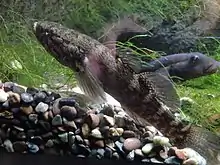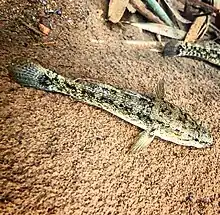Eleotris sandwicensis
[2]Eleotris sandwicensis, the Sandwich Island sleeper, Hawaiian sleeper or oopu, is a species of fish in the family Eleotridae endemic to the Hawaiian Islands, where it can be found in marine, fresh, and brackish waters around the coast. Due to this capability of migrating between different marine environments, they are amphidromous.[3] This fish can reach a length of 33 cm (13 in). It is locally important to commercial fisheries and is also used as bait by fishermen after larger fishes.[4] In the Hawaiian language, the fish is also known as oʻopu, ʻoau, ʻowau, and hiʻu kole.
| Eleotris sandwicensis | |
|---|---|
 | |
| Scientific classification | |
| Domain: | Eukaryota |
| Kingdom: | Animalia |
| Phylum: | Chordata |
| Class: | Actinopterygii |
| Order: | Gobiiformes |
| Family: | Eleotridae |
| Genus: | Eleotris |
| Species: | E. sandwicensis |
| Binomial name | |
| Eleotris sandwicensis | |

The distribution of E. sandwicensis is limited as this species does not have the ability to travel upstream of steep waterfalls.[5] This is due to their lack of pelvic fins.[5]
References
- NatureServe (2013). "Eleotris sandwicensis". IUCN Red List of Threatened Species. 2013: e.T7134A3137134. doi:10.2305/IUCN.UK.2013-1.RLTS.T7134A3137134.en. Retrieved 17 November 2021.
- Maie, Takashi; Furtek, Steffanie; Schoenfuss, Heiko L.; Blob, Richard W. (February 2014). "Feeding performance of the Hawaiian sleeper, Eleotris sandwicensis (Gobioidei: Eleotridae): correlations between predatory functional modulation and selection pressures on prey: Feeding Performance of a Piscivorous Predator". Biological Journal of the Linnean Society. 111 (2): 359–374. doi:10.1111/bij.12214.
- Sim, Tara (December 2006). "Reproductive Biology of Eleotris Sandwicensis, a Hawaiian Stream Gobioid Fish" (PDF).
- Froese, Rainer; Pauly, Daniel (eds.) (2013). "Eleotris sandwicensis" in FishBase. April 2013 version.
- Alda, F.; Gagne, R. B.; Walter, R. P.; Hogan, J. D.; Moody, K. N.; Zink, F.; McIntyre, P. B.; Gilliam, J. F.; Blum, M. J. (2016-07-21). "Colonization and demographic expansion of freshwater fauna across the Hawaiian archipelago". Journal of Evolutionary Biology. 29 (10): 2054–2069. doi:10.1111/jeb.12929. ISSN 1010-061X. PMID 27369460. S2CID 31136761.
